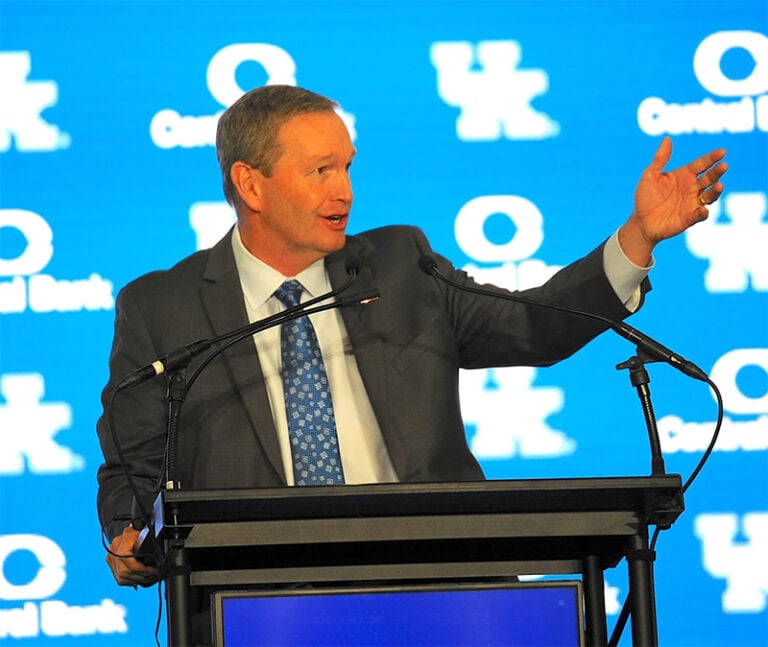Someone needs to remind Senate Republican Leader Mitch McConnell about that old saw regarding the man who kept beating his head against a brick wall because it felt so good when he stopped.
McConnell, of Louisville, is laying plans — for about the zillionth time — to destabilize the Affordable Care Act, this time by utilizing a Senate procedure he has sternly criticized in the past.
Speaking to reporters last week, McConnell said he is “going to consider’’ the process known as reconciliation to repeal “as much of Obamacare as is reconcilable.’’ He did not say when that step might be implemented.
Under reconciliation, opponents are prohibited from mounting a filibuster to block a vote. The rule requires only a simple majority for passage.
It should be noted that when the upper chamber finally adopted what has become known as Obamacare in March 2010, it utilized reconciliation. Senate Democratic Leader Harry Reid, of Nevada, found himself unable to muster the 60 votes needed to break a potential GOP filibuster in wake of the death of Sen. Edward Kennedy, D-Massachusetts, who was replaced by a Republican, Scott Brown.
So Reid turned to reconciliation. McConnell excoriated the maneuver at the time, telling the Washington Times that it “has never been used to do anything as massive as restructuring one-sixth of our economy.’’
Apparently the GOP leader has now either changed his mind or is in the process of doing so. To be fair, this is politics. Hypocrisy has rarely, if ever, stopped a lawmaker from reversing course and acting in his own self-interest. McConnell will proceed with his legislation to cripple the Affordable Care Act, President Obama will veto it, and the majority leader ultimately will have to decide how to proceed while avoiding a governmental shutdown, something he has vowed to avoid.
So forget about the procedural stratagem and focus on how absurd it is that Republicans, five years after the law’s implementation, are still trying to destroy it despite strong evidence that it has succeeded beyond even the wildest of dreams.
Obamacare’s triumph is undebatable. About 15 million Americans who previously did not possess health insurance are now covered either through the marketplaces created by the legislation or Medicaid expansion. The percentage of uninsured adults has dropped from 18 percent in the third quarter of 2013 to the current 11.9 percent – an astounding 6 percent decline in less than two years.
The numbers would be even more incredible if not for the refusal of governors in some states to adopt Medicaid expansion – a noteworthy neglect of duty on their behalf. Data from the Urban Institute shows that those states that have implemented Obamacare in full, including Medicaid expansion, have experienced a drop in the percentage of uninsured from 16 percent to 7.5 percent.

There’s more. According to the Kaiser Family Foundation it appears premium rate increases in 2016 will prove significantly lower than the historic average. A survey of 11 major cities found that the costs for the lowest and second-lowest cost silver plans that attract the bulk of enrollees are experiencing only modest increases. While the cost of a benchmark silver plan in those cities is on average 4.4 percent higher in 2016, it is well below the double-digit hikes many consumers experienced in earlier years.
The act has proved particularly successful in Kentucky, thanks in large measure to Gov. Steve Beshear’s decision to adopt Medicaid expansion. Recent figures show that the commonwealth has expanded Medicaid rolls by more than 500,000 and almost 110,000 have enrolled through the Kynect health insurance exchange.
Under the new law the federal government will pick up 100 percent of the cost of covering people made newly eligible for Medicaid through 2016 and no less than 90 percent thereafter. A report released by Deloitte Consulting and the Urban Studies Institute at the University of Louisville clearly established that the state’s Medicaid expansion will pay for itself through 2021 as a result of new job creation, depositing $30 billion into the state’s economy, and adding nearly $820 million to state and local budgets.
It also should be noted that the job growth estimates have, thus far, fallen below projections. But a recent uptick led commonwealth officials to offer assurances that the program will pay for itself at least through 2020.
“For all the naysayers who claimed that expanding Medicaid was a budget-busting boondoggle, take a look at the facts,’’ Beshear said when the report was released. “It’s working and it’s literally paying off. The state is saving money, hospitals are earning more and our people are getting healthier.”
After the U.S. Supreme Court upheld substantial provisions in the health care law for a second time, President Obama also asserted that it’s working.
“It has changed, and in some cases saved, American lives,’’ Obama said. “It set this country on a smarter, stronger course. The law has helped hold the price of health care to its slowest growth in 50 years” and he noted further that the “uninsured rate in America is the lowest since we began to keep records.”
So history has now progressed to the point where it’s difficult to recall what the Republican objections to the law were in the first place, other than it was championed by Obama. That hasn’t stopped McConnell, who has characterized it as “a rolling disaster for the American people.’’
McConnell said the law has “resulted in millions of Americans losing the coverage they had and wanted to keep’’ and cited what he characterized as “Obamacare’s spectacular flops, from humiliating website debacles to the total collapse of exchanges in states run by the law’s loudest cheerleaders.’’
He also cited “skyrocketing costs in premiums, deductibles and co-pays that have hit the middle class so hard over the last few years.’’
Well, a number of consumers lost coverage but were able to find new policies on the exchanges that were often superior and cheaper than their previous policies – the fact that 15 million who weren’t insured but now are answers that. And there were obvious and well-publicized problems with the program’s roll-out – glitches that mean absolutely nothing today.
Premiums are not skyrocketing. Some deductibles and co-pays have increased – as predicted. But that has been offset in many instances by the subsidies afforded those who don’t qualify for Medicaid but who otherwise may face financial burdens from the costs.
And so McConnell and his fellow Senate Republicans will continue to beat their heads against a brick wall, oblivious to the fact that it will feel so good when they stop. The ironic thing here, of course, is that McConnell himself is going to need Obamacare – to address the broken arm he is almost assuredly going to suffer from endlessly patting himself on the back.
Washington correspondent Bill Straub served 11 years as the Frankfort Bureau chief for The Kentucky Post. He also is the former White House/political correspondent for Scripps Howard News Service. He currently resides in Silver Spring, Maryland, and writes frequently about the federal government and politics. Email him at williamgstraub@gmail.com.


















